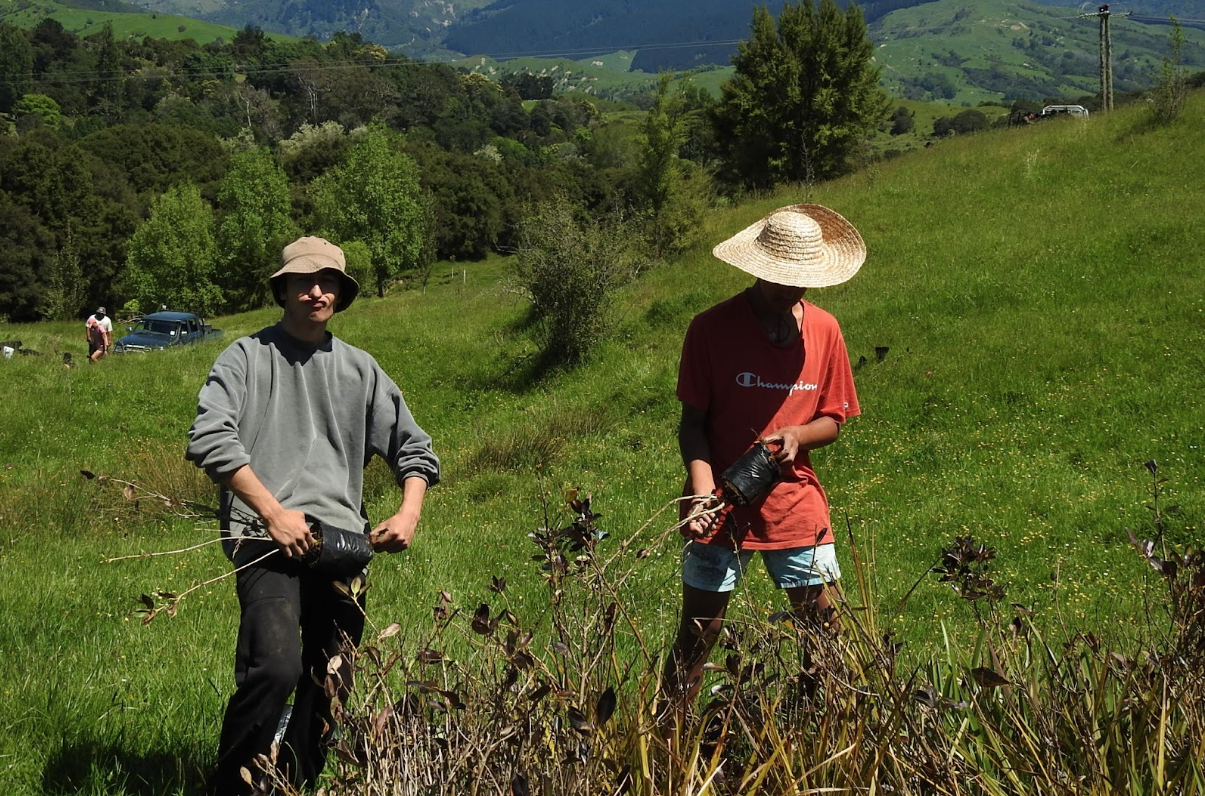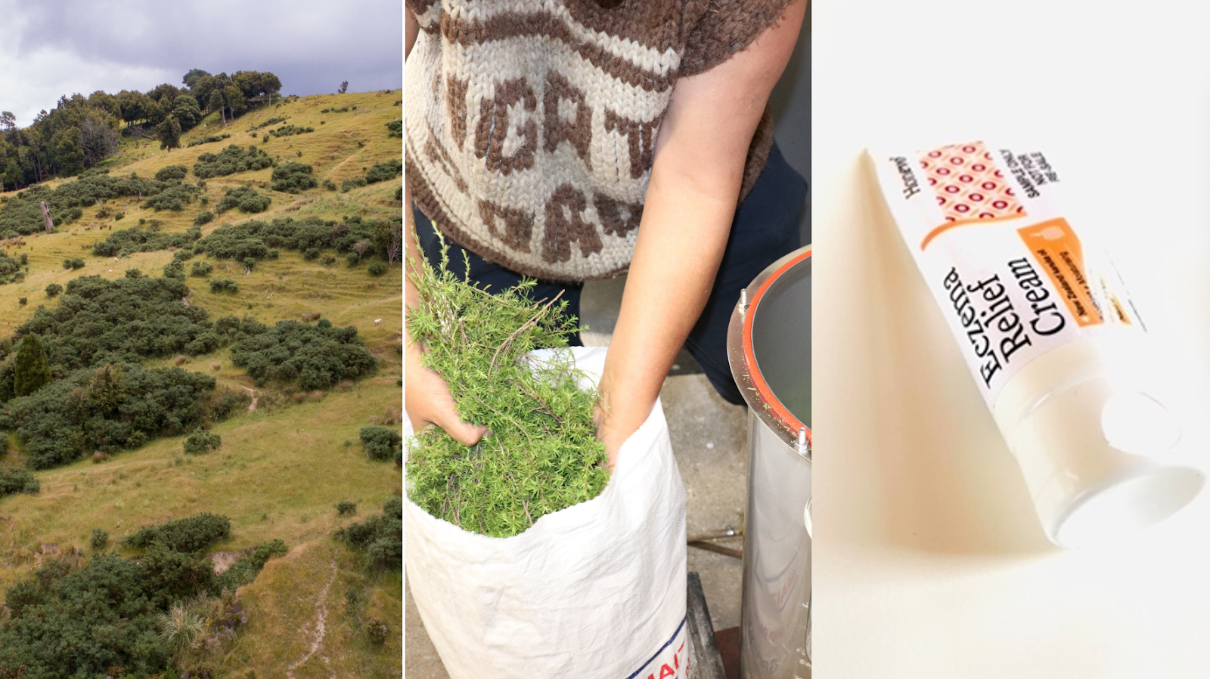Manu Caddie (Ngāti Pūkenga, Ngāti Hauā) is a biotechnology entrepreneur focused on truly sustainable land use and an indigenous bioeconomy. He is an advocate for restoring diverse native forest on erosion-prone land in Tairāwhiti as the region is locked in a constant cycle of climate-related disaster, recovery and preparation for the next weather event.
Top Header Image: New industries like health products made from sustainably harvested kānuka brush are emerging.
©Hikurangi Bioactives Limited Partnership
Our whānau lives on a 130 hectare block of Māori land just south of Ruatoria in Tairāwhiti. The block has over 400 owners and five trustees.The Trust recently became party to a joint claim, originally lodged with the Waitangi Tribunal in 2016, claiming the Crown breached Te Tiriti in a number of ways relating to climate change.
The specific breaches in the Trust’s claim include the operation of the Emissions Trading Scheme (ETS) and in particular its over-reliance on planting pines to offset Aotearoa’s emissions resulting in: low carbon prices for emitters and low returns for the Trust and other Maori forest owners; harmful effects on the environment such as slash running down rivers and associated soil erosion after plantation clear-felling; discouraging restoration of native forests that Māori have kaitiaki responsibilities for and Te Tīriti rights guaranteeing their protection.
The claim also alleges that the Crown has failed to support Māori communities in Tairāwhiti and elsewhere in adapting to the effects of climate change; that these communities are suffering more significantly than the general population; that the Government has failed to provide support for the development of equitable and just transition plans to support a rapid emissions reduction and economic development based on circular and regenerative local economies rather than extractive, unsustainable industries like exotic tree monocultures on eroding land; and a general failure of Government policies in reducing Aotearoa’s emissions, putting the survival of both land and people at risk.

Pine plantations on erosion-prone land have been collapsing in Tairāwhiti.
©Mana Taiao Tairāwhiti
The Trust is not focused on financial redress in this claim. It wants acknowledgment that the Crown is failing to protect taonga species that Māori have rangatiratanga rights and responsibilities for under Article Two of Te Tīriti. Māori need the Government to urgently make better policy that will value native reforestation rather than work against it through ETS settings and land use policies that privilege pine plantations and even pasture, instead of permanent native forests.
Post-cyclone analysis recently released by Manaaki Whenua Landcare Research, one of the Crown’s key research institutions, has demonstrated the failure of shallow-rooting pine plantations on land susceptible to erosion, which makes up nearly 90 percent of the total land in Tairāwhiti. It seems the remaining 12 percent is flood prone and at risk of continual inundation from woody debris – whole trees and harvested biomass – carried from the hills onto orchards, residential property and into the coastal marine environment. Around 70 local bridges and dozens of roads were destroyed by woody debris during the floods this year, and every major weather event brings more wood and sediment.
Agroforestry, regenerative land use, the circular economy and indigenising the bioeconomy are all buzzwords pointing to a better way of creating sustainable lifestyles and income for indigenous peoples around the world.
”Our culture is not for sale, but the unique taonga we have inherited can help build truly sustainable enterprises and support our whānau to move back onto our whenua.
Māori have a unique opportunity to lead global movements that restore native ecosystems while supporting indigenous peoples to thrive on our traditional lands and waters. Aotearoa has world class science, research and innovation communities keen to co-create new opportunities in authentic relationships with kaitiaki Māori.
Our culture is not for sale, but the unique taonga we have inherited can help build truly sustainable enterprises and support our whānau to move back onto our whenua.
So many taonga have been lost already, so many native species and remaining habitats are on the verge of collapse. It is our generation that has the opportunity and responsibility to save what we can, Recloaking Papaptūānuku with all the unique flora and fauna these islands were blessed with.
Predator control, planting, nurseries, breeding and other activities will need thousands of new jobs. Our whānau are well placed to lead this sacred mahi and earn our position as mana whenua, mana moana – kaitiaki who care in very practical ways.

Many Māori landowners are investing in returning the whenua to indigenous forest rather than expecting financial returns from collectively-owned land. Initiatives like Recloaking Papatūānuku could see both happening, along with helping New Zealand meet commitments for emission reductions.
©Totaranui Nama Ono Trust
Māori have a birthright to access the treasures of Tāne-mahuta and Haumia. Our language, tikanga and ways of seeing the world make most sense when we have a living relationship with indigenous forest.
Colonisation cut most of us off from this birthright – we moved out of the forest and the ‘conservation estate’ was established to “protect” what little remained of the unique ecology of Aotearoa. We have been separated too long, it is time to live with and within our ngahere again – we can’t do that when permanent pine plantations are prioritised by public policy.
This doesn’t mean abandoning modern civilisation to live in the trees. New technologies are replacing petrochemicals with polymers derived from wood, high value timbers demand premium prices and new pharmaceuticals are being developed from native plant extracts.
In the past few years, 450,000 hectares of farm land have been purchased by overseas companies to plant pine, which rightly concerns rural communities.
While New Zealand has made international commitments to reducing our contributions to global warming, it has also pledged to protect and restore native biodiversity. Government (of today or the future) need to be committed to incentivise native reforestation and biodiversity protection.
Māori leaders and landowners are in a prime position to help the Crown meet both its carbon and biodiversity obligations, and at the same time grow the Māori economy by advancing regenerative agriculture and horticulture, restoring the birthright of our tamariki as active kaitiaki of the whenua, and Recloaking Papatūānuku’s eroding slopes and gullies with vibrant native forests.
This article was also published on Newsroom.




Leave a comment